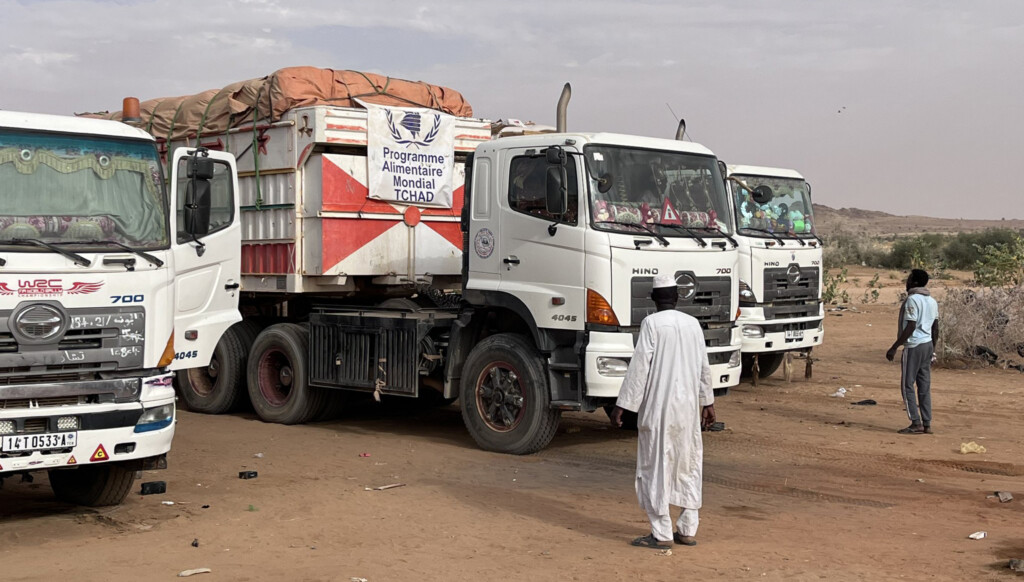UN: Plundering, bureaucracy, and dwindling resources ‘impede’ Sudan aid

UN World Food Programme aid convoy for Darfur, April 2024 (File photo: WFP)
The International Food Security Phase Classification (IPC) said that around 755,000 people face catastrophic levels of hunger in Sudan, the highest levels ever recorded. Organisations attempting to reach people in dire need of aid in Sudan, almost half the population, are severely hampered by bureaucratic and security challenges.
On July 1, the United Nations World Food Programme (WFP) said that three UN trucks carrying food supplies were plundered by “unidentified armed men” in the Jebel El Ahmar area, about 10 kilometres east of Zalingei, the capital of Central Darfur.
According to the WFP, the food supplies carried by the three trucks “looted” last Sunday were en route to Jebel Marra. The area, controlled by the Sudan Liberation Movement led by Abdelwahid Mohamed Nur (SLM-AW), has seen an influx of displaced people fleeing fighting in El Fasher since last May, to the areas of Tawila and Niertiti on the outskirts of Jebel Marra.
Radio Dabanga learned from humanitarian sources in Central Darfur that the state’s civil authority intensified its security efforts after the incident, to arrest the armed group that seized the foodstuffs.
This is not the first such incident. In May 2023, UN Under-Secretary-General for Humanitarian Affairs and Emergency Relief Coordinator Martin Griffiths told reporters that six trucks carrying humanitarian aid to Darfur were looted.
‘Catastrophic’ hunger
According to the latest International Food Security Phase Classification (IPC) report, 755,000 people are at the highest level of food insecurity (IPC Phase 5: Famine).
The UN Office for Coordination of Humanitarian Affairs (OCHA) says that this is the first time that catastrophic (IPC Phase 5) conditions have ever been confirmed in Sudan since the IPC was created in 2004. “Unlike the Darfur crisis of twenty years ago, the present crisis spans the whole country, with catastrophic levels of hunger even reaching the capital Khartoum and Gezira State, once Sudan’s breadbasket.”
On June 27, WFP warned that time is running out to avert famine in Darfur, especially with the escalation of fighting in El Fasher, the capital of North Darfur, between the Sudanese Armed Forces (SAF) and the Rapid Support Forces (RSF).
Amid UN warnings of a critical humanitarian situation, aid continues to reach the region intermittently and in insufficient quantities. A government official in El Tina, North Darfur, said that a convoy of 35 trucks loaded with humanitarian aid arrived last Friday evening on the Sudanese-Chadian border. “The aid consists of food supplies and medicines heading to three states in the region”, he told Radio Dabanga.
“The local government of North Darfur received the trucks on Saturday, and after reviewing them, the food supplies will move to South and Central Darfur.” Two trucks reportedly carrying medicines destined for Médecins Sans Frontières (MSF/Doctors Without Borders) will also head to North Darfur.
Administrative obstacles
On June 24, OCHA issued a statement explaining that the SLM-AW, which controls large parts of Jebel Marra, has implemented bureaucratic and administrative procedures which include the need to register humanitarian organisations to work in Sudan, obtain travel permits, pay registration fees. Moreover, the SLM-AW must participate in staff recruitment and fulfilling technical agreement requirements.
Additionally, the Sudanese Agency for Relief and Humanitarian Operations (SARHO), established by the RSF, has also implemented similar bureaucratic and administrative obstacles, including a mandatory approval of travel permits for humanitarian workers and supplies in West, South, Central, and East Darfur.
“The increasing trend of bureaucratic and administrative impediments by armed forces is impacting planned humanitarian operations and could trigger similar bureaucratic procedures from other armed forces in the Darfur and Kordofan regions”, OCHA lamented.
The Sudanese government in Port Sudan refuses to use the Adré crossing with Chad for humanitarian aid, accusing the RSF of seeking to exploit it to bring weapons and military equipment into their controlled areas.
SLM-AW
SLM-AW has rejected the accusations made by OCHA, telling Radio Dabanga the statement was “as unprofessional and lacking in accuracy and credibility”.
According to Najeeb El Zubeir, head of the SLM-AW civil authority, the movement has received many people fleeing from various cities and regions of Sudan impacted by war. “We have provided shelter and security in camps, sent multiple distress calls to the United Nations and its agencies, and met with numerous regional and international organisations, including OCHA, to ensure humanitarian aid reaches all displaced people and those affected by the war in Sudan.”
“The statement indicated that OCHA had requested access to areas under the SLM’s control more than three times to assess the humanitarian situation, but they had not followed through despite the SLM’s unconditional approval.” No comments were made by the SAF nor the de facto Sudanese government in Port Sudan.
SARHO
In response to OCHA’s accusations, SARHO Director Dawelbeit Yagoub told Radio Dabanga that these accusations are false. He asserted that more than 200 WFP trucks had entered various Darfur states “without obstacles”, in addition to some 899,000 families that received food aid within months. “If there were obstacles, the WFP would not have been able to target this number of families in such a short period.”
Yagoub dismissed concerns that the recent looting of three trucks would hinder relief operations in Darfur. He stated that there are ongoing discussions with the WFP to establish a clear map for coordination in areas not under RSF control. “This coordination will ensure a specific point for the handover of trucks between parties. This incident would not be an obstacle but rather the beginning of tighter coordination between the parties.”
The humanitarian crisis in Sudan remains severe due to the ongoing war, now approaching a year and a half. Severe hunger threatens the lives of half of the country’s population, approximately 25.6 million people.











 and then
and then